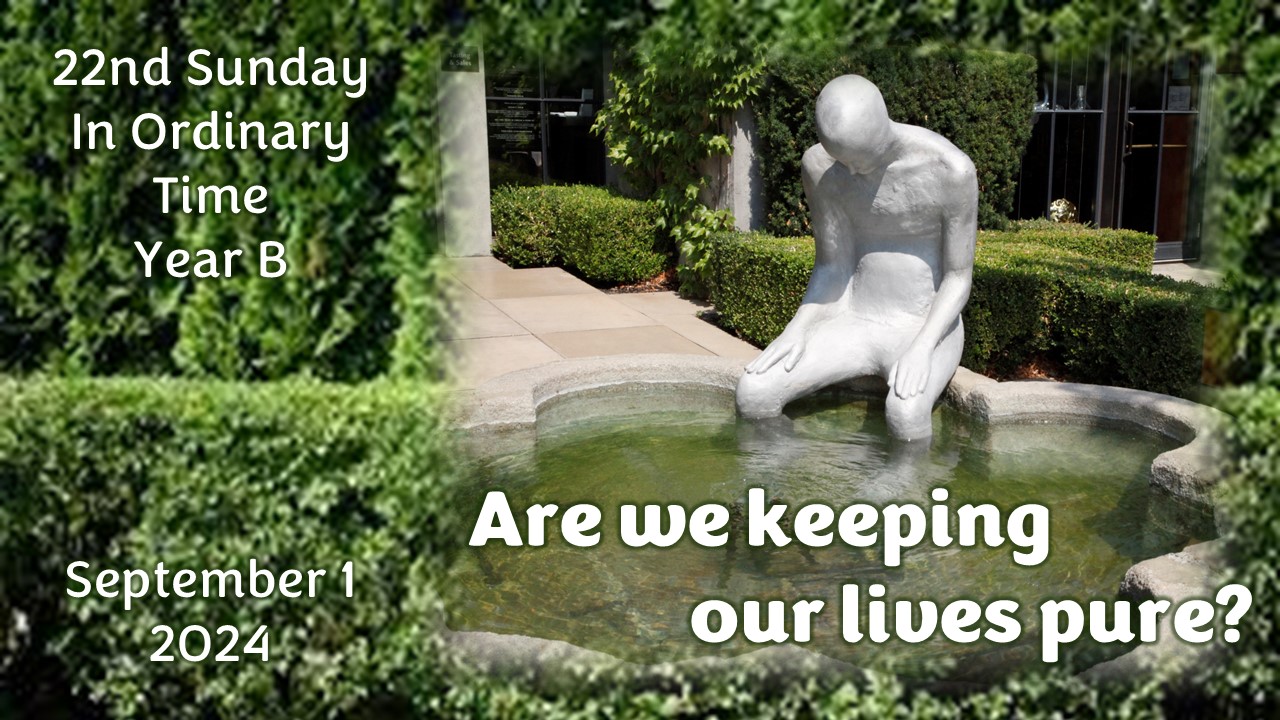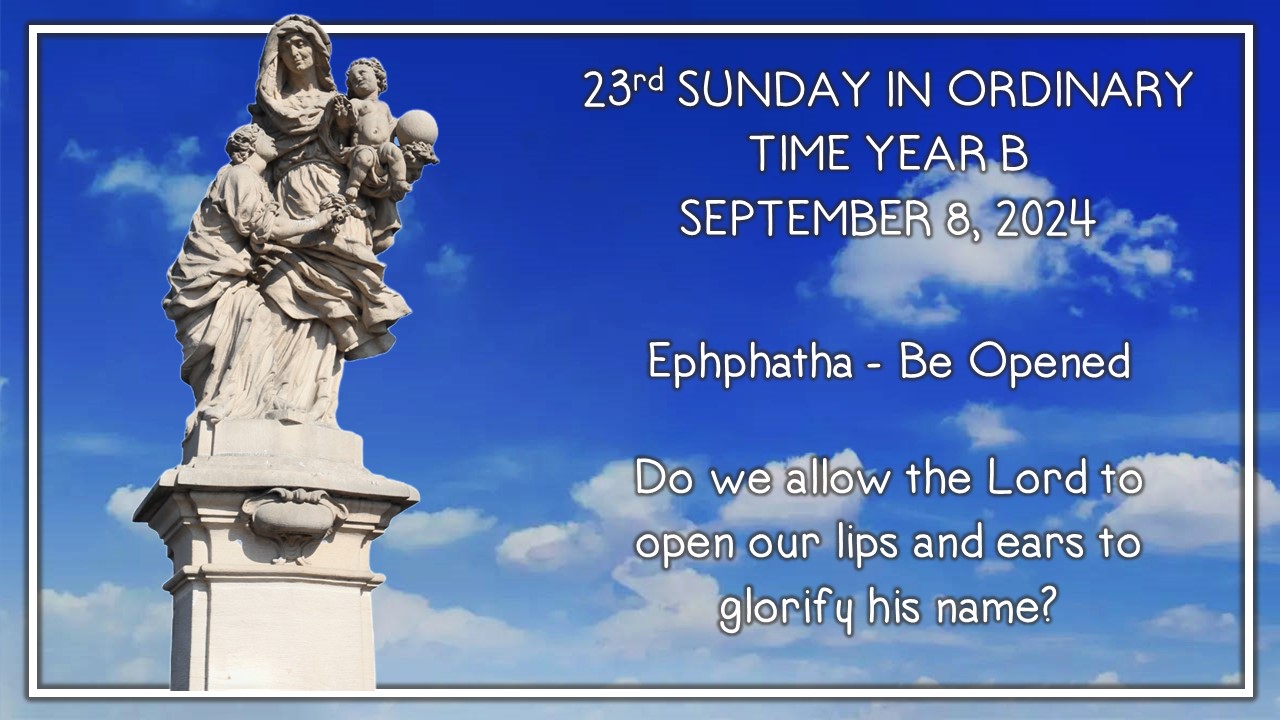
22nd SUNDAY IN ORDINARY TIME YEAR B ~ SEPTEMBER 1, 2024
22nd SUNDAY IN ORDINARY TIME YEAR B SEPTEMBER 1, 2024
KEEPING OUR LIVES PURE
The Gospel of John, chapter 6 was the center of our focus for the last 5 weeks. That chapter opened our eyes to see Jesus’s discourse on Bread of eternal life which leads us to have a strong relationship with the Lord. This weekend things are changing. Laws or rules either in the society or religion are there to help people, to discipline them and become good citizen or followers of a particular religion. These rules and regulations help people to enhance their relationship with one another and God as well. However sometimes people take these laws over the limits and then there is no respect left for humans. Of course, God’s people through the ages have always looked for ways of maintaining their purity of life by external structures and rules. The Jews developed a whole range of rules and regulations to govern everyday life, to help people be sure they were being faithful to God in every circumstance. But it didn’t stop with the Jews. The monastic movement in the Medieval Church developed various rules of life to help Christians structure their lives around the worship of God. So, in one version, the day was broken up into periods of work or rest separated by times of prayer.
What do we need today as we reflect on the Word of God this Sunday? Do we need external purification or internal? Being followers, we do need inner purification to have a better relationship with the Lord.
One day, a disciple and his teacher were walking through the forest. The disciple was disturbed by the fact that his mind was in constant unrest.
He asked his teacher: “Why are most people’s minds restless, and only a few possess a calm mind? What can one do to still the mind?”
The teacher looked at the disciple, smiled and said, “I will tell you a story.”
“On one beautiful day, an elephant was standing by the shade of a tree, eating its leaves. Suddenly, a small fly came buzzing and landed on the elephant’s ear. The elephant stayed calm and continued to eat, not heeding the fly.”
“The fly flew around the elephant’s ear, buzzing noisily, yet the elephant seemed to be unaffected. This bewildered the fly, and it asked, ‘Are you deaf?’
“No!” The elephant answered.
“Why aren’t you bothered by my buzz?” The fly asked.
“Why are you so restless and noisy? Why can’t you stay still just for a few moments?” Asked the elephant, and peacefully continued eating the leaves.
The fly answered, “Everything I see, hear and feel attracts my attention, and all noises and movements around me affect my behavior.”
“What is your secret? How can you stay so calm and still?”
The elephant stopped eating and said, “My five senses do not disturb my peace, because they do not rule my attention.”
“I am in control of my mind and my thoughts, and therefore, I can direct my attention where I want, and ignore any disturbances, including your buzz.”
“Now that I am eating, I am completely immersed in the act of eating. In this way, I can enjoy my food and chew it better. I am in control of my attention, and therefore, I can stay peaceful.”
Upon hearing these words, the disciple’s eyes opened wide, and a smile appeared on his face. He looked at his teacher and said:
“I now understand! My mind will always be in constant unrest, if my five senses, and whatever is happening in the world around me, are in control of it. On the other hand, if I am in command of my five senses, able to disregard sense impressions, and able to control my thoughts, my mind will become calm, and I will be able to disregard its restlessness.”
“Yes, that’s right,” the teacher answered, “The mind is restless and goes wherever the attention goes. Control your attention, and you control your mind.”
I strongly believe that once our eyes are focused on the Lord, there is no reason that we won’t have inner purification. In the First Reading we read that the Israelites are given laws to follow them so that they be people of God “You must observe them diligently, for this will show your wisdom and discernment to the peoples, who, when they hear all these statutes, will say, ‘Surely this great nation is a wise and discerning people!’” The first five Books of the Bible are full of rules and regulations for people to follow and live a very holy life and become chosen people of God.
In the Second Reading St. James is encouraging everyone to follow the value of “generous act of giving” which is greatest gift of our faith. Through giving we receive and by receiving we give because God keeps blessing us with his abundant blessings.
In the Gospel we have an interesting situation where Pharisees and scribes are arguing with Jesus regarding his disciples who are eating without washing their hands, thus defiling the traditions of the elders. Has our mother taught us to wash our hands before you eat? Now we can tell her that Jesus is against her rule, right? Wrong! The Pharisees washed their hands before eating, but not to cleanse themselves of germs, because they didn’t know about germs two thousand years ago. They washed their hands to obey their tradition, believing that if they ate with unwashed hands, they would become defiled and unacceptable to God. That small error in their thinking wouldn’t have been so bad, except that their misconception about what made them acceptable or unacceptable to God extended much farther. Some of the traditions they kept, violated God’s Word. Thus, as Jesus said, they rejected God’s specific laws and substituted their own traditions. Obeying man-made rules, they disobeyed God’s rules. One example of this was their breaking of the fifth commandment: “Honor your father and mother.” The Pharisees taught that a person didn’t have to help his needy parents if he vowed to give his money to God. Because they were lovers of money (Luke 16:14), this tradition was probably designed to increase their own personal wealth. The Pharisees wouldn’t have to spend their money supporting their elderly parents, plus, other people vowed to give their money to the Pharisees to support “God’s work” rather than help their parents. This was just one of many examples of how the Pharisees broke God’s law to protect their own traditions. Here comes Jesus to correct them and make sure they need inner purification as well.
Holy Father Pope Francis reflecting on the Gospel, explains the issue in this way “The discussion is about the value of the “tradition of the elders” (Mk 7:3) which Jesus, quoting the Prophet Isaiah, defines as the “precepts of men” which must never take precedence over the “commandment of God”. The ancient rules in question consisted not only in the precepts God revealed to Moses, but in a series of norms that the Mosaic Law indicated. The interlocutors observed these norms in an extremely scrupulous manner and presented them as the expression of authentic religiosity. Therefore, they rebuked Jesus and his disciples for transgressing them, specifically the norms regarding the external purification of the body. Jesus’ response has the force of a prophetic pronouncement: “You leave the commandment of God”, he says, “and hold fast the tradition of men”. These are words which fill us with admiration for our Teacher: we sense that in him there is truth and that his wisdom frees us from prejudice.
He continues to say, “After his exhortation, Jesus focuses attention on a deeper aspect and states: “there is nothing outside a man which by going into him can defile him; but the things which come out of a man are what defile him” (v. 15). In this way he emphasizes the primacy of interiority, that is, the primacy of the “heart”: it is not the external things that make us holy or unholy, but the heart which expresses our intentions, our choices, and the will to do all for the love of God. External behaviour is the result of what we decide in the heart, and not the contrary: with a change in external behaviour, but not a change of heart, we are not true Christians. The boundary between good and evil does not pass outside of us, but rather within us. We could ask ourselves: where is my heart? Jesus said: “Where your treasure is, there will your heart be also”. What is my treasure? Is it Jesus, is it his teaching? If so, then the heart is good. Or is my treasure something else? Thus, it is a heart which needs purification and conversion. Without a purified heart, one cannot have truly clean hands and lips which speak sincere words of love — it is all duplicitous, a double life — lips which speak words of mercy, of forgiveness: only a sincere and purified heart can do this.
What do we learn from the Sacred Scripture today? Pay heed! With these words, Jesus wants to caution us too, today, against the belief that outward observance of the law is enough to make us good Christians. Dangerous as it was then for the Pharisees, so too is it for us to consider ourselves acceptable or, even worse, better than others simply for observing the rules, customs, even though we do not love our neighbour, we are hard of heart, we are arrogant and proud. Literal observance of the precepts is a fruitless exercise which does not change the heart and turn into practical behaviour: opening oneself to meet God and his Word in prayer, seeking justice and peace, taking care of the poor, the weak, the downtrodden. We all know, in our communities, in our parishes, in our neighbourhoods, how much harm and scandal is done to the Church by those people who say they are deeply Catholic and often go to Church, but who then neglect their family in daily life, speak badly of others and so on. This is what Jesus condemns because this is a counter-witness to Christianity. We attend church every week, say the right things at the right times during the service, receive communion, and think that makes us acceptable to God. But the rest of the week, we lie, steal, judge, criticize, use foil language, and take God’s name in vain.
Let us focus our hearts and minds on the inner purification and let Jesus rest in our lives so that we can have peace of mind from disturbance and obstacles. I hope the following story will help us to focus.
Holy Monk, and his disciple, were strolling on the beach by the ocean. It was a cold day and the wind was blowing strongly over the ocean, raising very high waves.
After walking for some time, Holy Monk stopped, looked at his disciple and asked:
“What does the choppy ocean remind you of?”
“It reminds me of my mind and my rushing and restless thoughts.” Answered Disciple.
“Yes, the stormy ocean is like the mind, and the waves are the thoughts.” Holy Monk explained. “The mind is neutral like the water. It is neither good, nor bad. The wind is creating the waves, as desires and fears produce thoughts.”
“I wouldn’t want to be on a boat in the middle of the ocean, in a storm like this.” Said Disciple.
“You are there all the time within this storm.” Responded Holy Monk and continued, “Most people are on a rudderless boat in the middle of a choppy ocean, even if they do not realize it. The mind of most people is very restless. Thoughts of all kinds come and go incessantly, agitating the mind like the ocean’s waves.”
“Yes,” Disciple interrupted him, “You don’t need to tell me this, I know that. This is the reason I want to learn from you. I want to calm down the waves of my mind.”
Holy Monk looked at Disciple for a while, smiled, and said: “You don’t calm the ocean by holding the water and not letting it move. What is necessary is to stop the wind.”
“Your thoughts, desires and fears are like the wind, and you need to calm them down, and not let them rule your life. You learn to control them by controlling your attention and focus, and then the ocean of your mind would become calm.”
“And how do I do that?”
“Suppose it is possible for the ocean to disregard the wind, what would happen then?” asked Holy Monk.
“The waves would cease. However, no one can stop the wind.”
Holy Monk looked at Disciple with a mysterious smile and said:
“You can calm down the winds in your mind, which make the ocean of your mind restless. The winds are your thoughts, and the ocean is your mind.”
“Yes master”, said Disciple, “this is what I am trying to do. If I can succeed to calm the windows of my mind, would I also be able to bring more peace and calmness into the world around me?”
Are we keeping our lives pure?
Other Sermons In This Series

He Protects Us | November 14, 2021
November 14, 0201

2nd Sunday of Advent- Year A – December 4, 2022
December 02, 2022

23rd SUNDAY IN ORDINARY TIME YEAR B ~ SEPTEMBER 8, 2024
September 05, 2024

